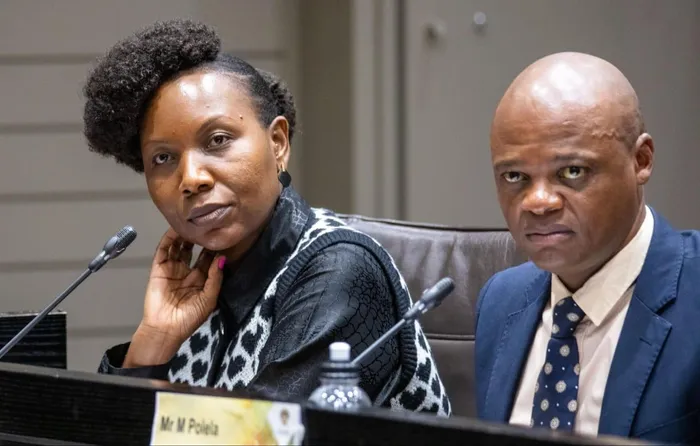
Road Accident Fund senior marketing manger Hlami Mathye and communications head McIntosh Polela at the Scopa's inquiry into into maladministration, financial impropriety and misuse of public funds at the entity.
Image: Photo: Parliament of RSA
The Road Accident Fund (RAF) ditched the Government Communications and Information Services (GCIS) as its media buyer and creative agency despite evidence suggesting GCIS was the more cost-effective option, a parliamentary inquiry has revealed.
This was revealed during the public hearing when the Standing Committee on Public Accounts (Scopa) probed the RAF’s procurement of media and marketing services by MediaMix 360 and Zinge Production.
This formed part of Scopa’s inquiry into maladministration, financial impropriety and misuse of public funds at the RAF.
Testifying at the inquiry, suspended senior marketing manager Hlami Mathye said the RAF used to utilise GCIS to procure media services and also tap on its panel of creative agencies for advertising until October 2020 when a memorandum of understanding GCIS was not renewed.
GCIS was initially used for media buying and its Memorandum of Understanding (MoU) was amended to increase its scope to include creative agencies.
However, when the MoU was due for renewal, RAF wanted to go to the market on a competitive bidding process in 2020.
Mathye said a request was put through the Bid Adjudication Committee (BAC) to recommend to the then-new CEO Collins Letsoalo.
“He did not approve stating that GCIS was not cost effective route,” she said.
Mathye also said they again made a cost benefit analysis that showed GCIS was cheap and made a resubmission for his consideration, but the RAF decided to undertake a procurement process to find a media buyer and creative agent.
“There was no promotional and branding panel due to the CEO not having approved the BAC recommendation to award that bid stating RAF ought to go about its own process.”
Scopa chairperson Songezo Zibi asked whether Letsoalo had the benefit of cost analysis when he made his decision.
In response, Mathye said Letsoalo made his decision based on submission that was in the package that came through the BAC making the recommendation after careful consideration from the business unit.
She also indicated that there was no MoU when the decision was made.
Mathye said Letsoalo refused to sign the renewal of the MoU, claiming “GCIS was not cost effective”.
“He rejected the report we presented to him. That is exactly what happened,” she said.
Communication head McIntosh Polela said he had asked about the possibility of going through the GCIS.
“I was told the MoU was no longer available for that,” Polela said.
Mathye explained the process followed in making submissions to the BAC, which makes recommendations to the CEO and a resolution is then taken by the executive management team.
“When that resolution that GCIS was not approved, we had to stop the process and went out to the market. We had to put up a business case for media buying and creative agency,” she said.
Meanwhile, the RAF officials were asked about the RAF's approach regarding direct claims as opposed to use of lawyers to lodge claims.
Polela said they had been told that lawyers were the problem.
Mathye said the matter had caused a lot of confusion as far back as 2019.
“When the new CEO came on to the scene he indicated we pull out anything pertaining to promotion of direct claims,” she said.
Mathye also said they had to pull out every advertising related to promoting direct claims and that came at a huge cost to the RAF because it was made to pay millions when they pulled out adverts that were already paid and lined up for broadcast and printing.
“That was not only financial implication from advertising, we had a lot of branding material and brought back into our store rooms,” she said.
Mathye even said they often joked as colleagues that they would never lodge claims directly with the RAF should they be involved in car accidents.
She urged Scopa to ask RAF’s senior managers whether they do promote direct claims.
“They will not answer you because there is no clear strategy pertaining to that,” Mathye added.
Pressed why she would not lodge a direct claim, she raised concern about the claim form being difficult to fill.
“If I can't fill that form, what about mama out there who can't go past the three sentences of the form,” Mathye said.
The inquiry continues and more witnesses are lined up to testify, including current and former executives and board members at RAF.
mayibongwe.maqhina@inl.co.za